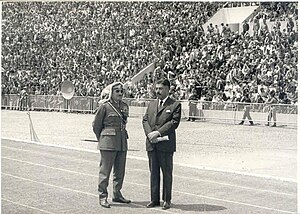Wasfi Tal
You can help expand this article with text translated from the corresponding article in Arabic. (February 2024) Click [show] for important translation instructions.
|
Wasfi Tal | |
|---|---|
| وصفي التل | |
 Wasfi Tal in 1962 | |
| 15th Prime Minister of Jordan | |
| In office 28 October 1970 – 28 November 1971 | |
| Monarch | Hussein |
| Preceded by | Ahmad Toukan |
| Succeeded by | Ahmad Lozi |
| In office 14 February 1965 – 4 March 1967 | |
| Monarch | Hussein |
| Preceded by | Bahjat Talhouni |
| Succeeded by | Hussein ibn Nasser |
| In office 28 January 1962 – 27 March 1963 | |
| Monarch | Hussein |
| Preceded by | Bahjat Talhouni |
| Succeeded by | Samir Al-Rifai |
| Personal details | |
| Born | 19 January 1919 Natural Sciences |
| Military service | |
| Allegiance | Syrian Arab Army 1948 Arab-Israeli War Black September |
Wasfi Tal (
Tal was born in Turkey to prominent Jordanian poet
Following the war, he served various positions in the Jordanian government, rising to higher positions after his abilities captured
Tal was reportedly loyal to
Early life and career
This section needs additional citations for verification. (November 2021) |

Tal was born in Arapgir to prominent poet
He then joined the British Army in Mandatory Palestine after being trained in a British-run military academy, and joined the irregular Arab Liberation Army to fight against Israel during the 1948 Arab–Israeli War. Due to his experience in the British army he started off with the rank of captain. After the Arab Liberation Army was dissolved in 1948 his unit was reassigned to the Syrian army for the remainder of the war under the new name Yarmuk Forces. By May 1949 he had risen to the rank of major.[6]
Following the war, he served various positions in the Jordanian government, rising to higher positions after his abilities captured
Assassination

On 28 November 1971, four
Tal was the first victim of the newly formed Black September Organization, a more militant offshoot of the Palestinian militant organization Fatah. His assassins were released on low bail and allowed to leave Egypt. Yasser Arafat, Fatah's leader, claimed responsibility for the killing.[8]
Tal was popular with Jordanians for his success in expelling the fedayeen. Meanwhile, he was widely denounced by Arabs who had supported the fedayeen. Egyptian President
Tal's body was flown back to
Personal life
Tal was married to Sadia Jabri, who had been former wife of the Palestinian leader of the 1940s, Musa Alami. They had no children.[16]
Honour
Foreign honour
- Malaysia:
 Honorary Grand Commander of the Order of the Defender of the Realm (SMN (K)) – Tun (1965)[17]
Honorary Grand Commander of the Order of the Defender of the Realm (SMN (K)) – Tun (1965)[17]
See also
References
- ^ "Hussein's Premier". The New York Times. 7 April 1971. Retrieved 28 November 2018.
- ISBN 9781134264902. Retrieved 29 November 2018.
- ^ Fallible Memory, Benny Morris
- ^ "Slain Jordanian Angered Many Arabs". The New York Times. 29 November 1971. Retrieved 29 November 2018.
- ^ Grose, Peter (29 November 1971). "Bloody reprisals feared for slaying of premier". Eugene Register-Guard. Ramallah. Retrieved 15 December 2012.
- ^ Susser, A. (2017). On both banks of the Jordan: a political biography of Wasfi al-Tall (Vol. 2). Routledge.
- ^ Fouad El Gawhary (30 November 1971). "Cairo assassin says he drank the blood of dying Premier". The Times. No. 58338. Cairo. Retrieved 2 November 2023.
- ^ ISBN 9780674768031.
- ISBN 9780313281129.
- ^ a b Amos, 1980, p.222.
- ^ Seale, 1982, p.81.
- ^ Bruce Hoffman (December 2001). "All you need is love: How the terrorists stopped terrorism". The Atlantic.
- ^ Shair, Kamal A. (2006). Out of the Middle East: the emergence of an Arab global business. p. 240.[permanent dead link]
- ISSN 0028-6583. Retrieved 27 January 2024.
- ^ "Avange Rebel's Death". The Deseret News. Caito. United Press International. 29 November 1971. Retrieved 15 December 2012.
- ^ "Wasfi Tel was bitter enemy of guerrillas". Gadsden Times. 29 November 1971. Retrieved 15 December 2012.
- ^ "Senarai Penuh Penerima Darjah Kebesaran, Bintang dan Pingat Persekutuan Tahun 1965" (PDF).
Bibliography
- Amos, John (1980). Palestinian resistance: organization of a nationalist movement. Pergamon Press. ISBN 0-08-025094-7.
- ISBN 0-679-40066-4.
- Susser, Asher (1994). On both banks of the Jordan : a political biography of Wasfi al-Tall. Frank Cass. ISBN 0714645281.

